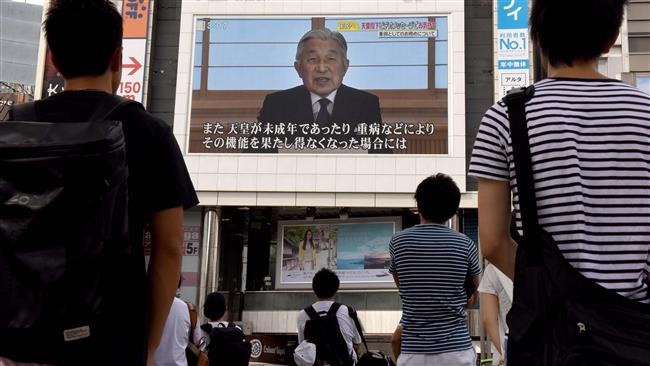-
Tips for becoming a good boxer - November 6, 2020
-
7 expert tips for making your hens night a memorable one - November 6, 2020
-
5 reasons to host your Christmas party on a cruise boat - November 6, 2020
-
What to do when you’re charged with a crime - November 6, 2020
-
Should you get one or multiple dogs? Here’s all you need to know - November 3, 2020
-
A Guide: How to Build Your Very Own Magic Mirror - February 14, 2019
-
Our Top Inspirational Baseball Stars - November 24, 2018
-
Five Tech Tools That Will Help You Turn Your Blog into a Business - November 24, 2018
-
How to Indulge on Vacation without Expanding Your Waist - November 9, 2018
-
5 Strategies for Businesses to Appeal to Today’s Increasingly Mobile-Crazed Customers - November 9, 2018
Japanese emperor makes rare public address, expresses concern about old age
Emperor Akihito, in a rare televised video message to the public on Monday, indicated his desire to abdicate – which is not possible under the current Imperial House Law – citing a growing concern that he could become unable to perform official duties due to his advanced age and declining health.
Advertisement
The rules governing imperial succession in Japan do not allow for an emperor to abdicate, and, indeed, Akihito did not explicitly use the word “abdication” in his 10-minute address to the nation, and, according to NHK, the Japanese broadcaster, he “maintained that he must refrain from making any specific comments on the existing Imperial system”.
“I am anxious that it will become really hard for me to carry out in full my role as a symbol [of the nation and unity of the Japanese people]”, the 82-year-old emperor said in a 10-minute televised address to the nation.
“There are times when I feel various constraints such as in my physical fitness”, the 82-year-old said in a national address.
Akihito ascended to the throne in 1989 after the death of his father, Hirohito, who was considered a deity until Japan’s defeat in the World War II, fought in the name of the emperor. The first time he had recorded such a message was after the 2011 tsunami, which claimed nearly 20,000 lives.
The role of Emperor in Japan is symbolic, but an abdication would be a dramatic change for Japanese society.
But some traditionalists in Prime Minister Shinzo Abe’s conservative ruling coalition are reluctant to open the abdication issue up for debate, because the process could introduce other changes they strongly oppose, like allowing women to inherit the throne.
Over the weekend, it was reported that Akihito’s speech will focus on the Emperor’s feelings regarding his duties “as a symbol of the nation”. The quiet discussion reportedly started about five years ago, around the time he had health problems – he was hospitalized for bronchitis in 2011, and had heart bypass surgery in 2012.
The first was in the days after the March 2011 triple quake, tsunami and nuclear disaster as he sought to calm a nation undergoing its worst crisis since World War Two.
“Since his majesty is getting so old, I was anxious about his health, but he made his intention clear and the abdication issue came up”, said 20-year-old Ryota Utsumi.
Under the USA -drafted constitution imposed on Japan after World War II, the emperor was stripped of all his powers, becoming a figurehead only.
He has no political power, and the law would need to be changed to allow for a transition of the Chrysanthemum Throne; whether to do so is now up to parliament, reports the Wall Street Journal.
In the address on Monday, Emperor Akihito said that his health and age were major factors in current concerns about how he should continue in his role.
Japan’s postwar constitution bars the emperor from any active political involvement.
Akihito has been cutting back on official duties recently, his place taken by his heir, 56-year-old crown prince Naruhito.
Advertisement
A man stands while listening to Emperor Akihito’s message in front of the Imperial Palace in Tokyo, Monday, Aug. 8, 2016.





























